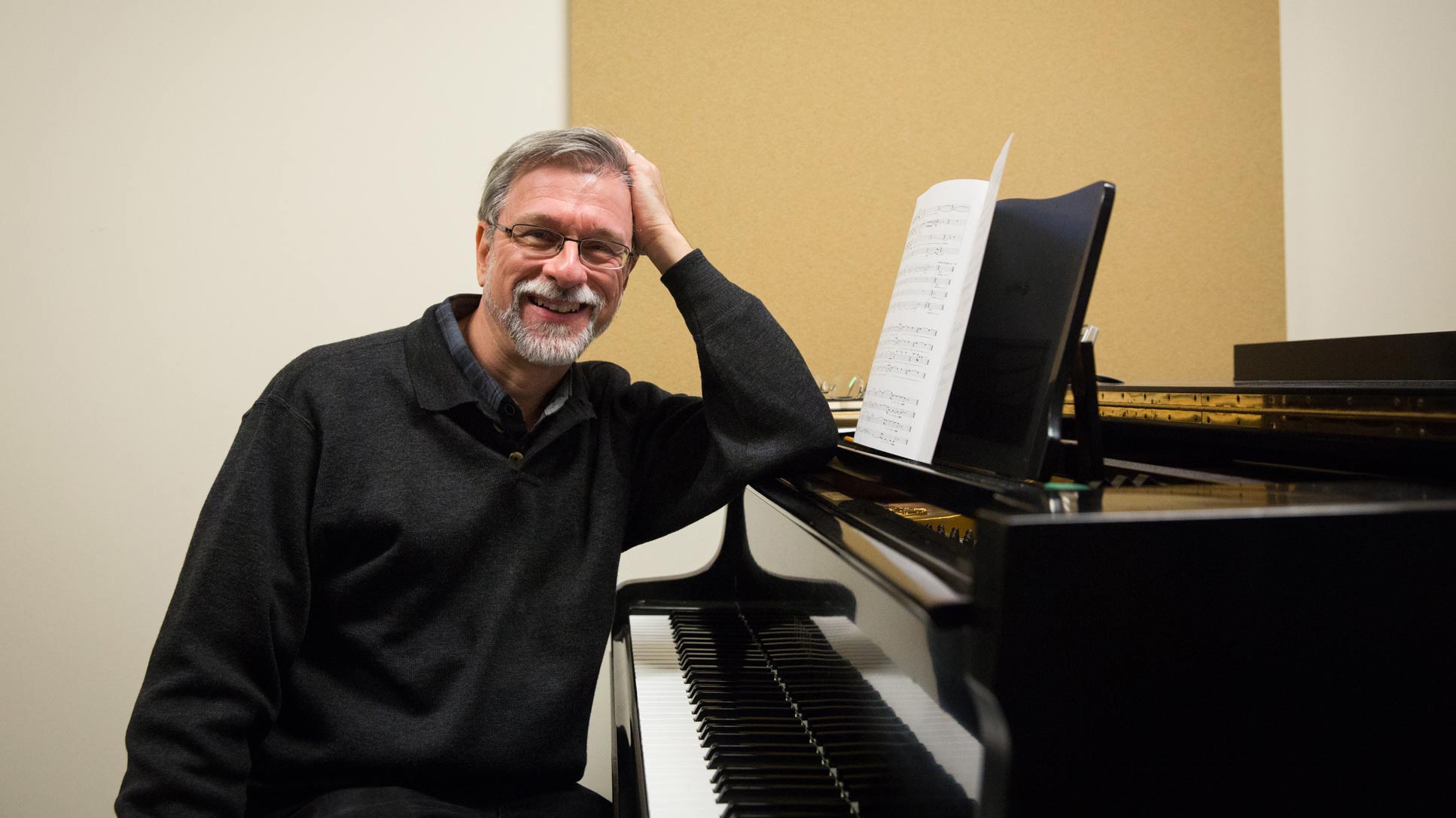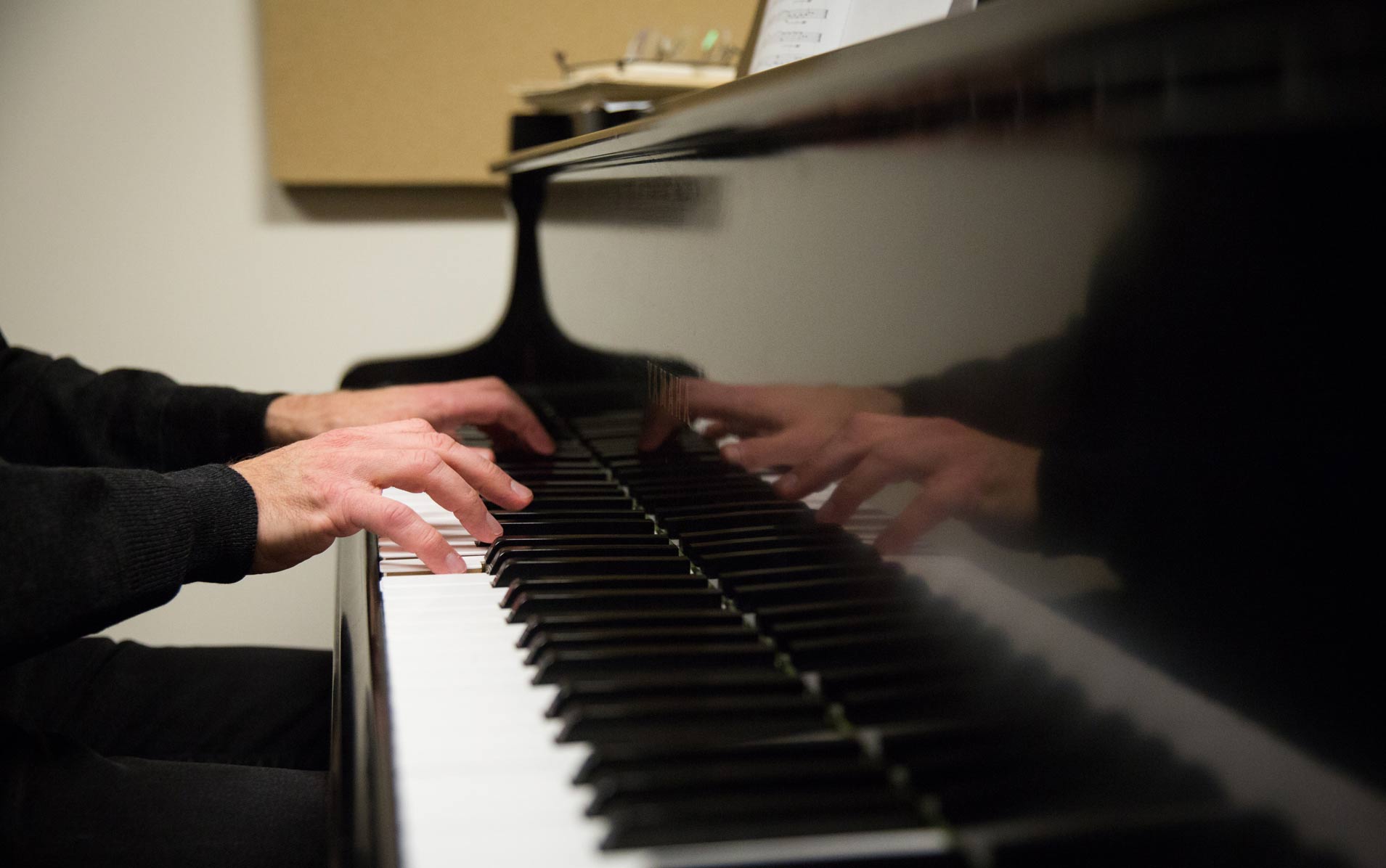Celebrating the Life and Music of James Primosch
On February 27 at the Annenberg Center, the longtime professor of music and acclaimed composer will be memorialized with the performance, Celebration and Remembrance: The Music of James Primosch.
On February 27 at the Annenberg Center, the life and music of James Primosch—longtime professor of music at Penn Arts & Sciences, whose loss has been keenly felt since he died in April 2021 at the age of 64—will be memorialized with the performance, Celebration and Remembrance: The Music of James Primosch.
An acclaimed composer, Primosch's works have been performed throughout the U.S. and in Europe by such ensembles as the Los Angeles Philharmonic, the St. Paul Chamber Orchestra, Collage, the New York New Music Ensemble, and the Twentieth Century Consort. Commissioned works by Primosch have been premiered by the Chicago Symphony, the Albany Symphony, Speculum Musicae, the Cantata Singers, and pianist Lambert Orkis.
Also active as a pianist, Primosch performed the works of many contemporary composers, including those of his former colleagues, composer George Crumb and Jay Reise, Professors Emeritus of Music. Two works composed specifically for him—one by another Professor Emeritus of Music and composer, Richard Wernick, and another by esteemed colleague and friend, John Harbison, Institute Professor Emeritus, Massachusetts Institute of Technology—will be included in the February 27 concert, as Primosch never got the chance to perform them.
Albums of Primosch’s music include Carthage (which was nominated for a Grammy Award for Best Choral Performance) and Descent/Return (both released in 2020), Vocalisms, and Sacred Songs, among others. His talents made an indelible impact on his fellow musicians and educators.
His musical style struck a fine balance between directness of expression, and fanciful exploration.
“Animated by a fascination with the alchemy of certain word-tone combinations, Jim very early found many ways to combine his literary discernment with a searching exploration of his spiritual beliefs,” says Harbison. “Using traditional canonical texts as well as recent writing—especially by Susan Stewart, Denise Levertov, and Annie Dillard—Jim carried forward the sacred music tradition with fresh impulse. His work was never decorous or reverential—it was always a vigorous, contemporary, unapologetic assertion of his heartfelt convictions. His musical style struck a fine balance between directness of expression, and fanciful exploration.”
Born in Cleveland, Ohio in 1956, Primosch studied at Cleveland State University, the University of Pennsylvania, and Columbia University. His primary teacher at Columbia was Mario Davidovsky. Primosch began teaching at Penn in 1988. During his time in the Department of Music, he held two endowed professorships and served as both the Chair and the Undergraduate Chair.
“Jim had this deep compositional technique at his fingertips that allowed him to reach and explore in groundbreaking ways and at the same time he maintained relationships with the music of his life—church music and jazz, especially—such that those friendly and familiar forces might just stop by in a given piece and say hello,” says Anna Weesner, Professor of Music.
Primosch was the recipient of many honors, including the 2020 Virgil Thomson Award in Vocal Music, a grant from the National Endowment for the Arts, a Guggenheim Fellowship, four prizes from the American Academy-Institute of Arts and Letters, a Regional Artists Fellowship to the American Academy in Rome, a Pew Fellowship in the Arts, the Stoeger Prize of the Chamber Music Society of Lincoln Center, and a fellowship to the Tanglewood Music Center, where he studied with Harbison.
His music somehow balanced absolute clarity of intent with a sense of organic unfolding, like he, the performer, and the listener are simultaneously exploring the material for the first time.
“If I were to try to describe Jim's music, it would undoubtedly represent a parallel description of who he was as a person: earnest and self-probing, curious and humble, but never waffling or indecisive,” says Ryan Macevoy McCullough, Visiting Lecturer at Cornell University. “His music somehow balanced absolute clarity of intent with a sense of organic unfolding, like he, the performer, and the listener are simultaneously exploring the material for the first time. I guess he really worked on his music as all three: as a composer, of course, but he was also a very skilled pianist, and an attentive listener (certainly through his teaching). His departure is really tragic, and painful, because he was so generous towards and beloved by his students and collaborators. We are so thrilled to be a part of this performance, and to see just how many people Jim's life touched.”
Harbison says he considers Primosch’s most singular and unrivaled achievements to be in the realm of unaccompanied choral music, “a genre which composer Luigi Dallapiccola deemed the most beautiful medium available to a composer,” he says. “Primosch achieved, in a series of motets for the Emmanuel Choir in Boston and The Crossing in Philadelphia, a vocal idiom both explorative and practical. The Crossing’s 2020 all-Primosch album, Carthage, which includes his Mass for the Day of St. Thomas Didymus, makes plain his achievement in this sublime genre without recent precedent.”
Primosch also worked as a liturgical musician.
“The vitality of Jim’s religious convictions, and a determination to remain rigorously Catholic in his weekly engagement with his home congregation encouraged him to find a way to serve his church by translating his musical skills into a more populist form of expression, evolving a congregational music that was movingly evident in the Memorial Service at his parish,” says Harbison.
Celebration and Remembrance: The Music of James Primosch will be held on February 27 from 7:00 p.m. to 9:00 p.m. at the Annenberg Center's Harold Prince Theater at 3680 Walnut Street, Philadelphia.
Click here for more information on the event.
Click here for more OMNIA content on Primosch and his music.





